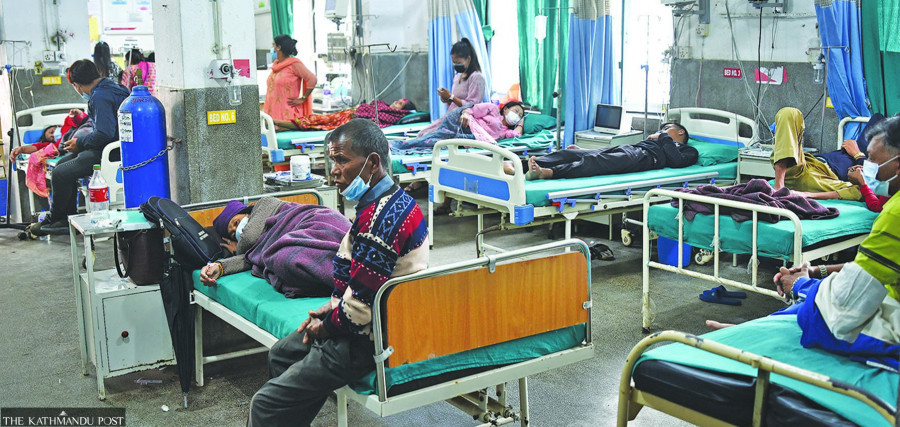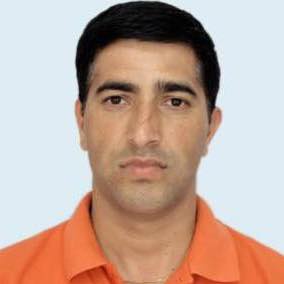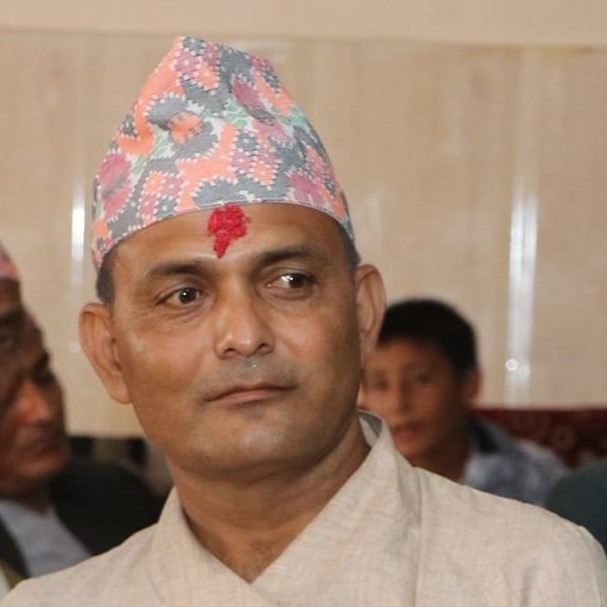National
No private hospital bed for poor patients
Hospitals run by the private sector are blatantly ignoring the mandatory 10 percent free bed allocation for the needy.
Deepak Pariyar, Ramesh Kumar Paudel, Ghanashyam Gautam & Binod Bhandari
Gyanumaya BK had been suffering from severe backaches for a while. The resident of Pokhara-15, BK visited the Metrocity Hospital in Srijanachowk seeking treatment five months ago. The 69-year-old, who works as a labourer, has already spent over Rs50,000 on follow-up checkups and medications.
BK spent eight days in the hospital in January and has been paying off loans she had taken to pay her bills and for follow-up visits to the hospital.
Had BK been aware of the Health Facility Operation Standards-2020, which private hospitals must adhere to, she wouldn’t have had to borrow money to pay her medical bills. As per the regulations, hospitals must set aside 10 percent of their total beds to the underprivileged and needy.
“I didn’t know hospitals were required to provide free treatment to those who can’t afford hospital stays,” BK said. “But even if I did, I would have to fight to get the service as the hospital won’t willingly offer me the service.”
The Pokhara-based 50-bed hospital’s Chief Executive Officer Gyan Prasad Aryal admits that his hospital does not adhere to the mandate. “We don’t have explicit information from the health ministry on the Health Facility Operation Standards-2020,” said Aryal. “Moving forward, we will follow the instructions.”
The hospital authorities say they give a 10-15 percent discount on the final hospital bill as opposed to dedicating 10 percent of their beds and free treatment and medications to the less privileged.
Hospitals with 15 beds come under the jurisdiction of the local units while those with up to 50 beds fall under the ambit of the Provincial Health Directorate. Likewise, the Provincial Health Ministry oversees health facilities with over 50 beds.
However, no regulatory body has data on whether health facilities are following government rules, especially Health Facility Operation Standards-2020. But it is an open secret that most private hospitals in Pokhara are not following the regulations.
Pokhara Municipality Health Department Officer Yadunath Baral, Kaski District Health Officer Bhim Prasad Poudel, and Province Health Director Khim Bahadur Khadka all admit that local hospitals disregard the regulations.
“Our monitoring and inspection is also lax, that’s why most hospitals ignore the rules,” he said. He says lack of manpower hampers effective inspection. “Our manpower is enough to conduct inspections in other districts, but not in Kaski, which has many private hospitals,” he said. “We need more people for that”.
According to Baral, although the hospitals claim to offer a certain discount on final bills to the needy, they are unable to show the record of the discounts provided.
“The hospitals claim they give discounts, but most hospitals have not even been able to show us the proof,” said Khadka. “Legal actions should be taken against the hospitals that fail to submit a monthly report on the free services for the poor. More importantly, they must be liable for flouting government standards that aim to benefit the poor.”
The Provincial Health Directorate also does not have any data on the directive’s implementation at hospitals with more than 50 beds.
The department’s chief of health services Dr Ramesh KC says that they have been working on updating information of health services in the Gandaki region.
“Hospitals have failed to submit their mandatory monthly reports. We will seek that information when they come for new permits or permit renewal,” KC said.
There are 27 privately-owned hospitals within the Pokhara Metropolitan City and 39 in the Gandaki region.
Bharatpur Metropolitan City in Chitwan in Bagmati Province is also called the ‘medical city’ as it is home to 23 private hospitals with a total of 1,200 beds. Additionally, there are multiple large-scale government hospitals and two medical colleges—Chitwan Medical College and College of Medical Sciences—that also provide medical services.
Had the Health Facility Operation Standards-2020 been followed by the 23 private hospitals, 120 patients would have received free health services every year, according to Durgadutta Chapagain, chief of the Chitwan Health Office.
“Although the hospitals claim they provide the services, none have been able to provide convincing proof. Instead, we found them giving such discounts to patients who are close to hospital operators,” said Chapagain. “Our department validates the permits for new health facilities and re-registrations for hospitals with a 25-bed capacity. We have asked such public health service providers to put up posters or stickers reading ‘Discounts for the needy’ on the hospital premises so that patients know what services they can get on discount.”
Meanwhile, Bikram Adhikari, Secretary of the Private Hospitals Coordination Committee in Chitwan, claims that the regulations are impractical.
“There are a few services that hospitals can provide free of cost. You cannot expect hospitals to provide all services for free. That’s why there is a need to amend the existing regulations,” said Adhikari.
The monitoring bodies’ inaction and lackadaisical approach to ensuring that public health services are accessible and affordable to all makes private hospitals blatantly ignore government mandates.
Bharatpur Metropolitan City’s Deputy Mayor Chitrasen Adhikari says that although the metropolis is aware that private hospitals must allocate 10 percent of their beds for free treatment of poor people, the metropolis administration has yet to devise a monitoring mechanism.
“We have not taken any steps towards that end, but we will soon,” he said.
Just like Pokhara and Chitwan, Biratnagar is also plagued with the same problem. There are 32 private hospitals currently in operation in the metropolis. Deepak Bhattarai, statistical officer at the municipality’s health office, asserts that none of the health facilities met the set requirements.
A monthly report submitted by the Biratnagar-based Nobel Medical College and Teaching Hospital, which has 750 beds, stated that the hospital had provided the said concession to more than 400 patients.
“However, the report did not clarify how many of the 400 patients were provided free hospital beds and the services that come along with the beds, and how many were given discounts on their hospital bills,” Bhattarai said. “We found that hospital reports also include concessions provided to patients who sought outpatient, emergency, and X-ray services.”
The hospital’s director Narayan Dahal claims to be following all government instructions. He says 10 percent hospital beds are set aside for needy patients who are not charged any treatment fees, while 10 percent of service seekers also get discounts.
Although the Biratnagar Metropolis has directed all health facilities under its jurisdiction to allocate free beds and provide free services to the needy, inform service seekers about the government-provided services, and submit a list of all patients who have received the services, the directive is ignored more often than followed.
According to Bhattarai, medical establishments must get a letter from the local unit before making any upgrades or purchasing any equipment. “But the hospitals have been found presenting fake documents in order to acquire such permits,” he said. “The metropolis has refused such permits to 12 private hospitals in the current fiscal year.”
Butwal Sub-Metropolitan City in the Lumbini Province has also taken no concrete step to ensure private hospitals adhere to Health Facility Operation Standards-2020. Despite having the authority to carry out inspections, the sub-metropolis’ apathy has deprived hundreds of needy patients of various government services.
The sub-metropolis with 17 wards has more than two dozen big hospitals in the Butwal bazaar area itself. Not one of them adheres to the government’s health regulations. But the sub-metropolis is yet to monitor these hospitals.
Yubraj Pandey, chief of Butwal Sub Metropolitan’s health department, says they have been unable to inspect medical institutes due to a lack of a proper set of rules.
“I have just been transferred here. Discussions are underway to prepare legal requirements,” he said.
Private hospitals in Butwal only began filing their reports two months ago after a joint meeting, informs Chief of the Sub Metropolitan’s Education and Health Department Mitramani Khanal.
Twenty-year-old Suraj BK of Sarawal Rural Municipality-2 in West Nawalparasi got into a motorcycle accident on April 26. He suffered injuries on both his legs and was taken to Zenus Hospital and Research Centre in Butwal.
Suraj was handed a bill of Rs 70,000 for treatment but he did not have the money to clear the bill and sought the hospital’s help. “The hospital refused to provide any discount. They in fact refused to discharge me. I got my discharge papers only four days later after I paid almost Rs 100,000,” he said. “I had to get a loan to pay the hospital bills as my father, who is a farmer, did not have that kind of money.”
Dr Sharda Singh, the hospital director, said Suraj did not qualify for a discount as he did not have a recommendation letter from the local unit. “Patients have to get a recommendation to avail of free services at private hospitals but Suraj could not bring one,” she said.
“I was in the hospital bed for four days. I could not have secured a recommendation from the local unit in that state,” said Suraj.
Ishwari Prasad Chapagain, a civil society leader of Rupandehi and a member of the Consumer Interest Protection Forum, says private hospitals in Butwal are more interested in making money than helping those in need. “They do not follow government mandates. They act as if they have to bear the expenses of providing free service to the poor when in fact they get tax rebates and such for such services,” he said. “The sub-metropolis also does not do the needful. Everyone is corrupt including the city officials.”




 18.12°C Kathmandu
18.12°C Kathmandu.jpg)
1.jpg)

















